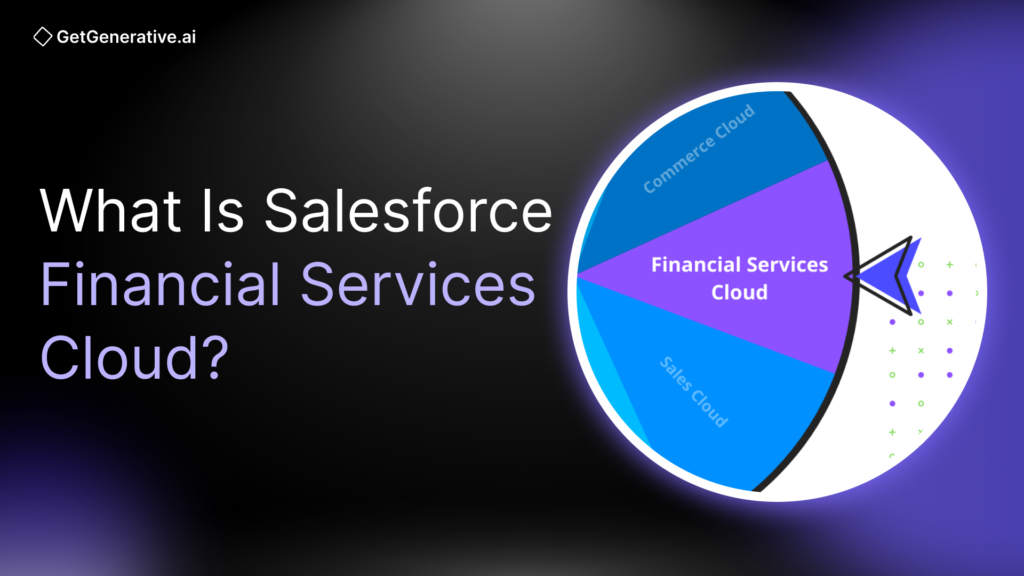What Is Salesforce Financial Services Cloud?
Financial institutions are under pressure like never before – demanding customers, tightening regulations, and the need to modernize legacy systems. To compete, firms must deliver personalized, digital-first experiences while ensuring compliance and operational efficiency.
Salesforce Financial Services Cloud (FSC) is Salesforce’s industry-specific CRM designed to meet these needs. It extends the power of Salesforce Customer 360 with financial data models, automation tools, AI-driven insights, and integration capabilities tailored to the complex workflows of banks, insurers, wealth management firms, and credit unions.
In this blog, we’ll break down:
- What FSC is and how it differs from generic CRMs
- Key features and benefits across industries
- Implementation strategy and best practices
- Real-world case studies from leading financial institutions
Let’s dive into how FSC is redefining CRM for financial services.
What Is Salesforce Financial Services Cloud?
Salesforce Financial Services Cloud is a purpose-built CRM platform that enhances Salesforce’s core offerings (Sales Cloud, Service Cloud, Data Cloud, etc.) with financial-industry-specific capabilities. It enables firms to manage customers, households, accounts, goals, and compliance in a unified, intelligent system.
Key Components of FSC
1. Industry Data Model
FSC comes with a pre-configured data model built for financial services, including:
- Household & Person Account
- Financial Account
- Financial Goal
- Life Event
- Relationship Group
For example, instead of treating customers as isolated entities, FSC lets banks structure data around households, linking multiple individuals and financial products under one umbrella. This delivers a true 360° customer view—critical for financial planning, servicing, and cross-sell strategies.
2. Unified Customer Profile
Advisors and relationship managers gain one-click access to:
- KYC status
- Account balances
- Investment portfolios
- Risk profiles
- Client communications
Example: RBC Wealth Management once needed 3–4 hours across 26 systems to prepare for a single client meeting. With FSC, all relevant data is surfaced instantly, saving hours of effort and enabling personalized conversations.
3. AI and Predictive Analytics
Integrated with Einstein AI and Salesforce Data Cloud, FSC delivers predictive insights, such as:
- Likelihood of clients opening new accounts
- At-risk financial goals
- Opportunities for refinancing or upselling
In fact, a Salesforce survey found that 50% of consumers expect AI to enhance their financial relationships, higher than in many other sectors. FSC positions firms to meet these expectations with embedded intelligence.
4. Integration with Core Systems
Financial institutions rarely replace their core systems. FSC is built to sit on top of existing tech stacks, integrating via:
- MuleSoft APIs
- Salesforce Data Cloud
- Pre-built connectors
Example: Mascoma Bank integrated FSC with 66 legacy systems using Data Cloud, giving staff a unified view of customer activity across channels.
5. Compliance and Security
FSC includes built-in compliance tools powered by:
- Salesforce Shield (for audit trails, encryption, and event monitoring)
- Role-based access and data governance
- Automated Action Plans for workflows like KYC and suspicious transaction reviews
Example: RBC Wealth applied advanced encryption to safeguard sensitive financial data—something general CRMs require custom build-outs for.
Why Choose FSC Over Generic CRM?
The differentiator is industry fit.
Feature | Generic Salesforce CRM | Financial Services Cloud (FSC) |
Data Model | Standard objects (Accounts, Contacts) | Prebuilt for financial data: Households, Goals, Financial Accounts |
Client Relationships | One-to-one | Many-to-one (e.g. Family, Advisors, Multi-Entity) |
Workflow Automation | Generic process builder | Templates for onboarding, insurance claims, KYC |
AI Insights | Sales forecasting | Financial goal tracking, next best action for advisors |
Security | Requires custom setup | Out-of-the-box encryption, audit logs, role-based controls |
Integration | General-purpose | APIs and templates for banking, insurance, and wealth systems |
FSC reduces time-to-value by up to 50% for common workflows (e.g. client onboarding, loan application review), thanks to its prebuilt features and data structure.
“The big message I have for a lot of CEOs that I meet with is, ‘Hey, you know, we’re the last generation of CEOs to only manage humans.’ I think every CEO going forward is going to manage, you know, humans and agents together.”
— Marc Benioff, CEO of Salesforce
Key Features of Financial Services Cloud
1. Industry-Specific Data Model & 360° Customer View
With FSC, users can track and unify:
- Individual and household profiles
- All financial accounts (checking, savings, loans, investments)
- Financial goals and life events
- Relationships and advisor hierarchies
Example: A wealth advisor can see net worth, upcoming college payments, and a client’s risk tolerance on a single dashboard.
2. Relationship Mapping
Map complex client relationships using Relationship Groups:
- Households
- Corporate stakeholders
- Business-advisor networks
This is especially helpful in B2B wealth or insurance sales, where multiple stakeholders must be tracked.
Example: RBC Wealth used this feature to assign the right advisors to multigenerational family clients, enhancing trust and retention.
3. Workflow Automation with Action Plans
Use Action Plans to automate steps like:
- Account opening
- Loan approvals
- Policy renewals
- Claims processing
These workflows assign tasks, trigger follow-ups, and enforce compliance.
Result: RBC Wealth cut onboarding time from weeks to 24 minutes by automating key workflows in FSC.
4. AI Insights with Einstein and Agentforce
FSC uses Einstein AI to:
- Recommend financial products
- Identify churn risk
- Automate goal tracking
And with Agentforce (Salesforce’s generative AI layer), firms can deploy digital agents that:
- Handle routine inquiries
- Surface policy data via Slack or mobile
- Automate internal reporting
Stat: Salesforce research shows that 65% of FS customers expect AI to reduce friction, up from 46% in 2023.
5. Collaboration & Mobility
FSC extends the power of Salesforce’s collaboration ecosystem:
- Salesforce Chatter for internal messaging
- Slack integration for real-time cross-team coordination
- Mobile and tablet apps for in-field advisors
Example: Advisors can review a client’s portfolio and update tasks during an onsite meeting, ensuring context, speed, and accuracy.
6. Compliance and Security
Built with regulatory rigor in mind, FSC includes:
- Audit trails and encryption via Salesforce Shield
- Field-level security for SSNs, account numbers
- Validation rules and alerts to prevent compliance gaps
Use Case: RBC Wealth leveraged these features to protect PII and implement industry-compliant workflows for suitability and disclosures.
7. Pre-Built Integrations (MuleSoft, Data Cloud)
FSC connects with:
- Core banking systems (Temenos, Finacle)
- Policy admin platforms (Guidewire)
- Salesforce ecosystem (Service Cloud, Tableau, Marketing Cloud)
Also Read – Salesforce Products Explained: The Ultimate Guide
Benefits of Salesforce Financial Services Cloud
1. Enhanced Engagement & Personalization
FSC enables hyper-personalized experiences by aligning product offerings with each customer’s financial journey.
Stat: Salesforce data shows that 46% of customers (and 55% of high-income customers) would stay loyal even with price increases if the experience is strong.
2. Operational Efficiency
- Automates manual processes (onboarding, KYC, claims)
- Reduces IT complexity by consolidating tools
- Increases productivity with AI assistants
3. Improved Compliance and Risk Management
FSC helps track and prove regulatory compliance:
- Audit logs
- Automated workflows (KYC, AML)
- Role-based visibility
4. Unified Data & Analytics
With Data Cloud and Tableau, FSC unlocks:
- Cross-sell insights
- Risk scoring
- Segment-level performance tracking
5. Better Acquisition and Loyalty
FSC’s segmentation, campaigns, and AI suggestions help boost acquisition and retention.
6. Innovation & Agility
With three major Salesforce releases per year and a vast AppExchange, FSC supports:
- Rapid rollouts of new features
- Low-code configuration
- Continuous innovation
Implementation Strategy: Best Practices
1. Data Strategy & Migration
Start with:
- Clean, deduplicated records
- Mapping legacy fields to FSC objects
- Using tools like MuleSoft, Data Loader, and Data Cloud
2. Core Integration
Use MuleSoft for:
- Real-time transaction sync
- Loan & policy updates
- Read/write data flows
3. Low-Code Customization
Leverage:
- Lightning App Builder
- Flow & Process Builder
- AppExchange accelerators
4. Change Management
- Identify champions
- Provide hands-on training
- Track KPIs (logins, task completions)
5. Governance & Security
Set up:
- Data Governance Council
- Sharing rules & encryption policies
- Automated alerts and audit dashboards
6. Pilot, Iterate, Scale
Use agile rollouts:
- Start with one line of business (e.g., mortgages)
- Track impact (e.g., faster approvals, reduced churn)
- Expand across the org
Also Read – Salesforce Financial Cloud Implementation Guide
Real-World Case Studies
1. Mascoma Bank
Unified 66 legacy systems with Data Cloud; automated name change and loan requests.
Result: Real-time service delivery at community bank scale.
2. RBC Wealth Management (U.S.)
Consolidated 26 systems; onboarding time dropped from weeks to 24 minutes.
Result: 50% drop in IT costs, advisor satisfaction soared.
3. LV= Insurance (UK)
Digitized 20%+ of claims with FSC.
Result: 99% of customers said they’d repurchase.
4. PenFed Credit Union
Enabled omnichannel support via Salesforce, reducing support costs and improving NPS.
Common Challenges and Solutions
Challenge | Best Practice |
Legacy System Integration | Start with read-only syncs using MuleSoft |
Data Migration Risks | Pilot with high-value data, validate with dry runs |
User Resistance | Use gamification, champions, and role-based training |
Compliance Complexity | Implement Salesforce Shield, field encryption, and validation rules |
Measuring ROI | Define KPIs early and create dashboards to track success |
Conclusion
Salesforce Financial Services Cloud offers a powerful platform for transformation in banking, insurance, and wealth management. By combining AI, unified data, automation, and regulatory controls into a single solution, FSC enables:
✅ Faster customer onboarding
✅ Stronger compliance & risk management
✅ Higher client satisfaction
✅ Scalable innovation
✅ Measurable ROI
Plan smarter and implement faster with GetGenerative.ai.
Explore how GetGenerative.ai can automate Salesforce projects end-to-end — from proposal to go-live — using AI-powered agents.
Book your free demo today!
FAQs
1. What is Salesforce Financial Services Cloud?
Salesforce Financial Services Cloud is a CRM platform designed specifically for the financial services industry. It offers tools and features tailored to banking, wealth management, insurance, and more.
2. How does FSC integrate with existing banking systems?
FSC integrates with existing banking systems using APIs, pre-built connectors, middleware solutions, and custom integrations.
3. Can FSC help with loan origination?
Yes, FSC can streamline loan origination processes through automation, integration, document management, and workflow management.
4. What are the key benefits of FSC for wealth management?
FSC offers personalized client experiences, improved collaboration, enhanced client engagement, regulatory compliance, and scalability.
5. How does FSC enhance customer relationship management in retail banking?
FSC enhances CRM in retail banking by providing a unified customer view, personalized marketing, omni-channel support, predictive analytics, and efficient customer service.




